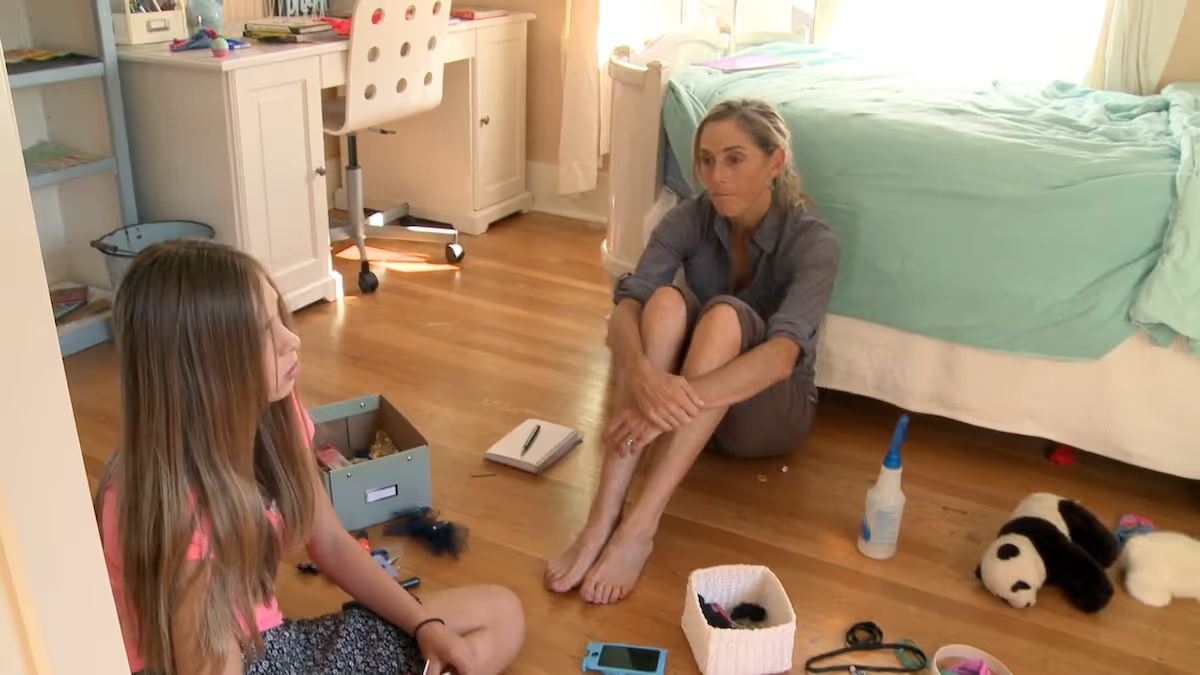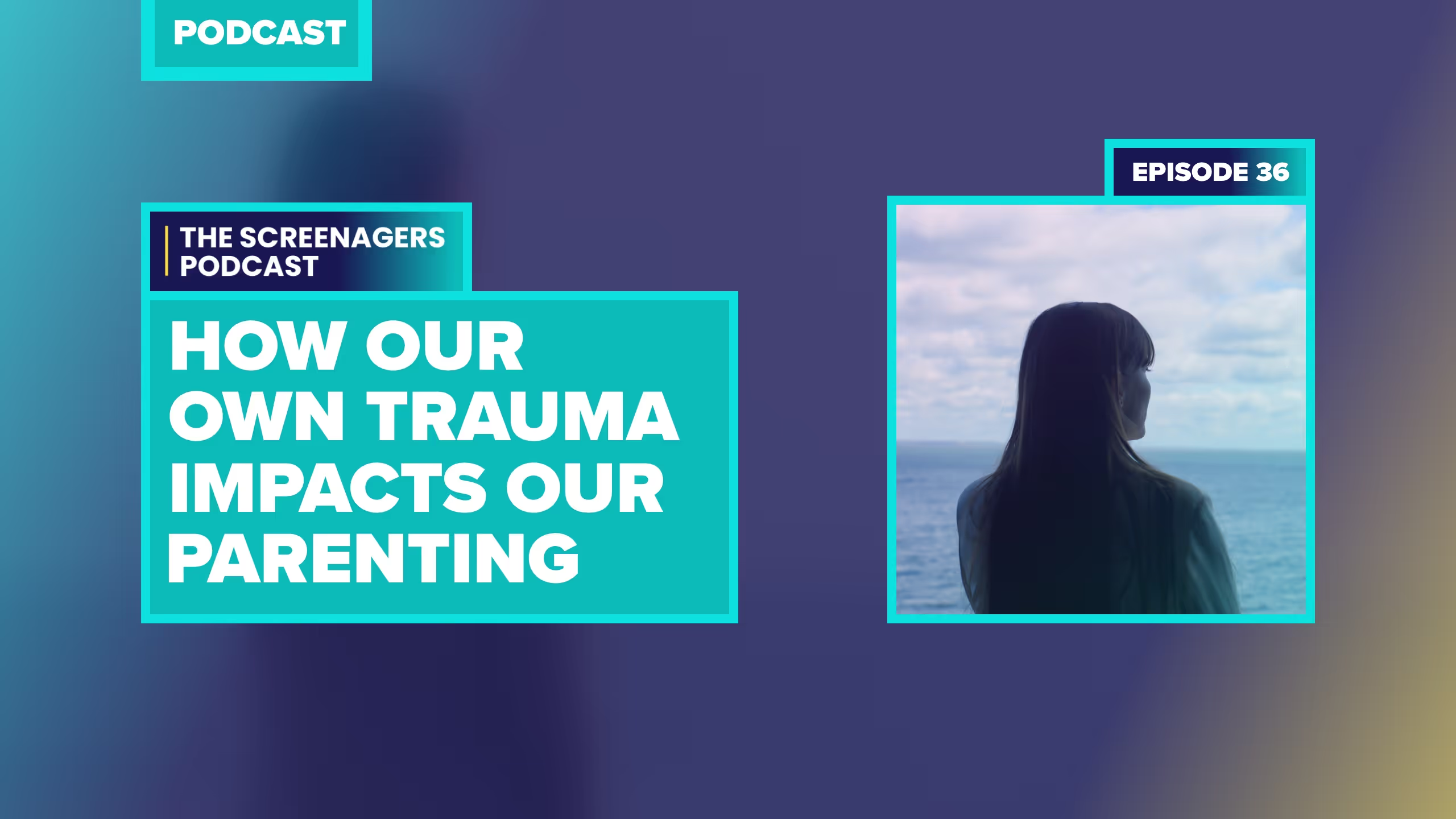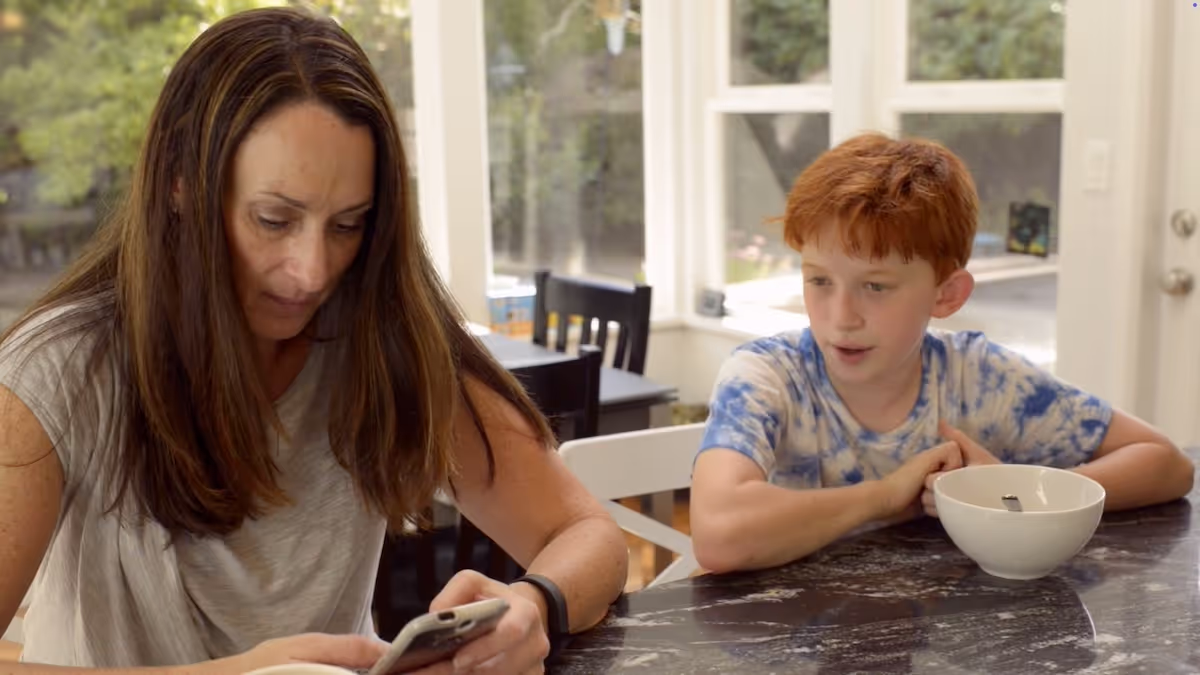


“We have to be very aware of the wounding things from our childhood, and we have to be very intentional about what we want to structure for our children. And insight sets you free.”
That is a quote from David Johnson, a therapist for more than 40 years, former head of mental health centers, friend, and one of the wisest people I know regarding mental health.
For this TTT, I am sharing a snippet of my conversation with Johnson that was released on this week’s episode of the Screenagers Podcast, titled: How Our Own Trauma Impacts Our Parenting
In the Podcast, David and I discuss how parents' past adversities — both Big T and Little T traumas — can impact how we parent our kids during conflict, especially around digital time dramas, and we discuss solutions.
The section I’m about to share relates to a teen and a stepdad and the issue of the stepdad's tendency to react with serious anger.
This topic of our traumas and our parenting is such an important one because when things set us off due to our own hard experiences, whether in childhood or later, our potentially effective responses get hijacked, and we can respond in ways that make things worse.
David talks about the four common responses when we are triggered as parents, including one called the “fawning” response and introduces a concept called “thinking errors,” which I find very helpful.
I share some of my past adversities and what I do not to let them impact my parenting and woven throughout the episode are many strategies we can all employ as parents and as adults in general to be more effective communicators.

Listen Here: Apple Podcasts // Spotify // YouTube // Website
Learn more about showing our movies in your school or community!
Join Screenagers filmmaker Delaney Ruston MD for our latest Podcast

Learn more about our Screen-Free Sleep campaign at the website!
Our movie made for parents and educators of younger kids
Learn more about showing our movies in your school or community!
(I’ve edited the podcast transcript slightly for clarity.)
DELANEY RUSTON: So the four most common responses to trauma are fight, flight, freeze, and fawn. Those responses get encoded into our brains and bodies and can be triggered in all sorts of situations. I asked David to walk me through some scenarios involving parents and kids around screen time.
DAVID JOHNSON: I'm thinking of a family I worked with where a stepfather, who was relatively new to the parenting role in that family, had a quick trigger response, and he would go from 0 to 100 immediately.
When a teenage daughter was in conflict about a video game she wanted to play that he felt was not okay to play, he became verbally abusive and almost slapped her. The mother had to step in and stop that interaction.
But what we want to do in a situation like that is we don't want to shame the father who may think that he's inadequate and should never have a role in helping raise this child. But what we need to do is help him understand that in his childhood, that kind of response, that violent response, maybe kept him in line, but it built up resentment, anger, and hatred.
I was able to help him come from his kinder self and come from a curious space about wanting to understand what made the teenage daughter want what she wanted and what motivated her to do what she does.
DELANEY RUSTON: Sometimes, it can feel like someone's just making an excuse. Well, listen, my dad always yelled at me, and that's why I'm yelling or, you know, I almost hit you because I was hit as a kid.
How did that go down, the conversations?
DAVID JOHNSON: When the stepfather talked about his childhood and how he was treated as a child, I was compassionate towards him. I was compassionate towards the wounded child who experienced that difficulty and then could engage the father in remembering who he really is in the here and now.
And most of the time, he's a kind man. He's a reasonable man, but when triggered, he becomes a violent man. And so, to remind himself to come from his kind self rather than the legacy violent self. People respond when you give them a pathway of respect and kindness, when you help them not feel that they have to be stuck in the home of their childhood, but instead could be a better parent, a nurturing presence rather than a violent one.
They were relieved to learn that. It's good for everybody to understand how they behave when stressed. What errors do I make when I'm stressed? For instance, some people may raise their voices and begin to yell. The truth is, the moment you speak more rapidly and the tone of your voice is louder, that's often the end of communication.
People don't hear any of the words, but they hear the anger. And we have to help ourselves. If something has happened and we're upset about it and we want to talk with our child about it, we need to slow down the cadence of our speech deliberately. We need to exaggerate a calm tone of voice so that the message gets through.
Listen to the podcast episode here: Apple Podcasts // Spotify // YouTube // Website
Learn more about showing our movies in your school or community!
Join Screenagers filmmaker Delaney Ruston MD for our latest Podcast

Learn more about our Screen-Free Sleep campaign at the website!
Our movie made for parents and educators of younger kids
Join Screenagers filmmaker Delaney Ruston MD for our latest Podcast
Be sure to subscribe to our YouTube Channel! With new ones added regularly, you'll find over 100 videos covering parenting advice, guidance, podcasts, movie clips and more. Here's our latest!
As we’re about to celebrate 10 years of Screenagers, we want to hear what’s been most helpful and what you’d like to see next.
Please click here to share your thoughts with us in our community survey. It only takes 5–10 minutes, and everyone who completes it will be entered to win one of five $50 Amazon vouchers.
“We have to be very aware of the wounding things from our childhood, and we have to be very intentional about what we want to structure for our children. And insight sets you free.”
That is a quote from David Johnson, a therapist for more than 40 years, former head of mental health centers, friend, and one of the wisest people I know regarding mental health.
For this TTT, I am sharing a snippet of my conversation with Johnson that was released on this week’s episode of the Screenagers Podcast, titled: How Our Own Trauma Impacts Our Parenting
In the Podcast, David and I discuss how parents' past adversities — both Big T and Little T traumas — can impact how we parent our kids during conflict, especially around digital time dramas, and we discuss solutions.
The section I’m about to share relates to a teen and a stepdad and the issue of the stepdad's tendency to react with serious anger.
This topic of our traumas and our parenting is such an important one because when things set us off due to our own hard experiences, whether in childhood or later, our potentially effective responses get hijacked, and we can respond in ways that make things worse.
David talks about the four common responses when we are triggered as parents, including one called the “fawning” response and introduces a concept called “thinking errors,” which I find very helpful.
I share some of my past adversities and what I do not to let them impact my parenting and woven throughout the episode are many strategies we can all employ as parents and as adults in general to be more effective communicators.

Listen Here: Apple Podcasts // Spotify // YouTube // Website
(I’ve edited the podcast transcript slightly for clarity.)
DELANEY RUSTON: So the four most common responses to trauma are fight, flight, freeze, and fawn. Those responses get encoded into our brains and bodies and can be triggered in all sorts of situations. I asked David to walk me through some scenarios involving parents and kids around screen time.
DAVID JOHNSON: I'm thinking of a family I worked with where a stepfather, who was relatively new to the parenting role in that family, had a quick trigger response, and he would go from 0 to 100 immediately.
When a teenage daughter was in conflict about a video game she wanted to play that he felt was not okay to play, he became verbally abusive and almost slapped her. The mother had to step in and stop that interaction.
But what we want to do in a situation like that is we don't want to shame the father who may think that he's inadequate and should never have a role in helping raise this child. But what we need to do is help him understand that in his childhood, that kind of response, that violent response, maybe kept him in line, but it built up resentment, anger, and hatred.
I was able to help him come from his kinder self and come from a curious space about wanting to understand what made the teenage daughter want what she wanted and what motivated her to do what she does.
DELANEY RUSTON: Sometimes, it can feel like someone's just making an excuse. Well, listen, my dad always yelled at me, and that's why I'm yelling or, you know, I almost hit you because I was hit as a kid.
How did that go down, the conversations?
DAVID JOHNSON: When the stepfather talked about his childhood and how he was treated as a child, I was compassionate towards him. I was compassionate towards the wounded child who experienced that difficulty and then could engage the father in remembering who he really is in the here and now.
And most of the time, he's a kind man. He's a reasonable man, but when triggered, he becomes a violent man. And so, to remind himself to come from his kind self rather than the legacy violent self. People respond when you give them a pathway of respect and kindness, when you help them not feel that they have to be stuck in the home of their childhood, but instead could be a better parent, a nurturing presence rather than a violent one.
They were relieved to learn that. It's good for everybody to understand how they behave when stressed. What errors do I make when I'm stressed? For instance, some people may raise their voices and begin to yell. The truth is, the moment you speak more rapidly and the tone of your voice is louder, that's often the end of communication.
People don't hear any of the words, but they hear the anger. And we have to help ourselves. If something has happened and we're upset about it and we want to talk with our child about it, we need to slow down the cadence of our speech deliberately. We need to exaggerate a calm tone of voice so that the message gets through.
Listen to the podcast episode here: Apple Podcasts // Spotify // YouTube // Website
Be sure to subscribe to our YouTube Channel! With new ones added regularly, you'll find over 100 videos covering parenting advice, guidance, podcasts, movie clips and more. Here's our latest!
Sign up here to receive the weekly Tech Talk Tuesdays newsletter from Screenagers filmmaker Delaney Ruston MD.
We respect your privacy.
“We have to be very aware of the wounding things from our childhood, and we have to be very intentional about what we want to structure for our children. And insight sets you free.”
That is a quote from David Johnson, a therapist for more than 40 years, former head of mental health centers, friend, and one of the wisest people I know regarding mental health.
For this TTT, I am sharing a snippet of my conversation with Johnson that was released on this week’s episode of the Screenagers Podcast, titled: How Our Own Trauma Impacts Our Parenting
In the Podcast, David and I discuss how parents' past adversities — both Big T and Little T traumas — can impact how we parent our kids during conflict, especially around digital time dramas, and we discuss solutions.
The section I’m about to share relates to a teen and a stepdad and the issue of the stepdad's tendency to react with serious anger.
This topic of our traumas and our parenting is such an important one because when things set us off due to our own hard experiences, whether in childhood or later, our potentially effective responses get hijacked, and we can respond in ways that make things worse.
David talks about the four common responses when we are triggered as parents, including one called the “fawning” response and introduces a concept called “thinking errors,” which I find very helpful.
I share some of my past adversities and what I do not to let them impact my parenting and woven throughout the episode are many strategies we can all employ as parents and as adults in general to be more effective communicators.

Listen Here: Apple Podcasts // Spotify // YouTube // Website

Thoughtful family tech rules help protect kids’ wellbeing, learning, and sleep while strengthening connection at home. Using the fresh start of a new year, this post shares eight practical tech habits families can discuss and adapt together, including shared social media check-ins, screen time inventories, device-free meals, regular gaming breaks, and keeping phones out of bedrooms at night.
READ MORE >
Psychologist Jean Twenge explains how parental controls can support healthier tech use by protecting sleep, limiting late night device access, and reducing kids’ exposure to content they are not developmentally ready to handle. She discusses why third party parental control tools are often more effective and easier to use than built in options, while acknowledging that no system is perfect. Clear boundaries, combined with technology based limits, can reduce ongoing conflict and make screen time rules easier to enforce.
READ MORE >
for more like this, DR. DELANEY RUSTON'S NEW BOOK, PARENTING IN THE SCREEN AGE, IS THE DEFINITIVE GUIDE FOR TODAY’S PARENTS. WITH INSIGHTS ON SCREEN TIME FROM RESEARCHERS, INPUT FROM KIDS & TEENS, THIS BOOK IS PACKED WITH SOLUTIONS FOR HOW TO START AND SUSTAIN PRODUCTIVE FAMILY TALKS ABOUT TECHNOLOGY AND IT’S IMPACT ON OUR MENTAL WELLBEING.
